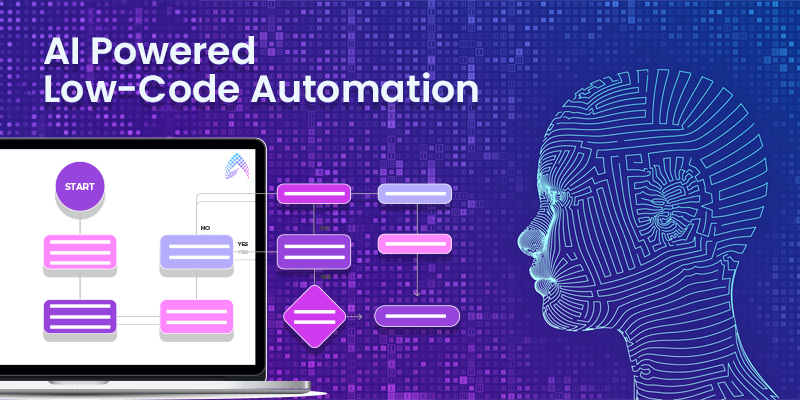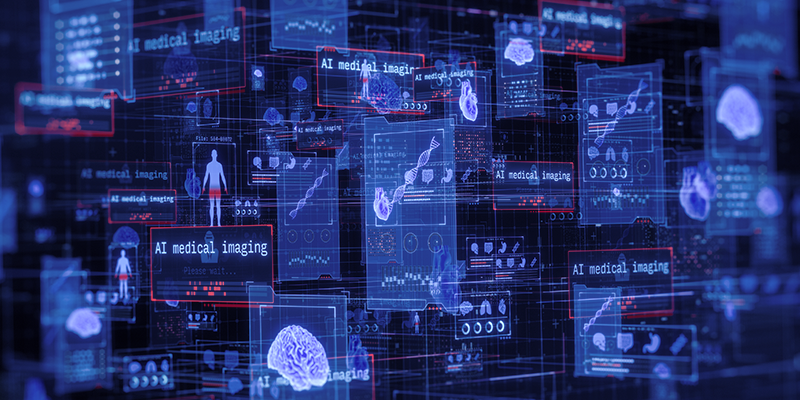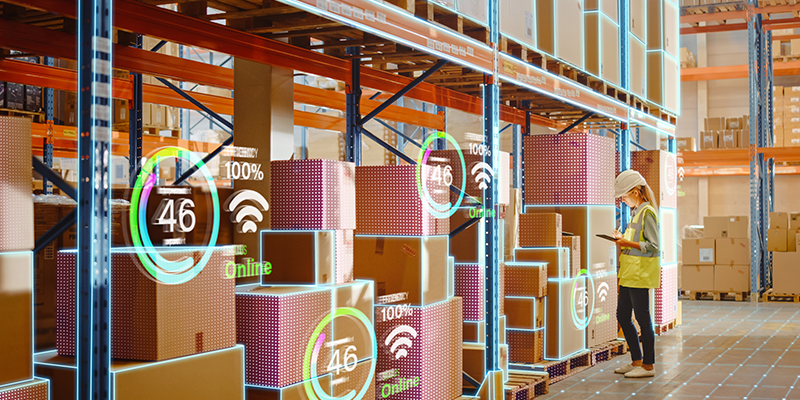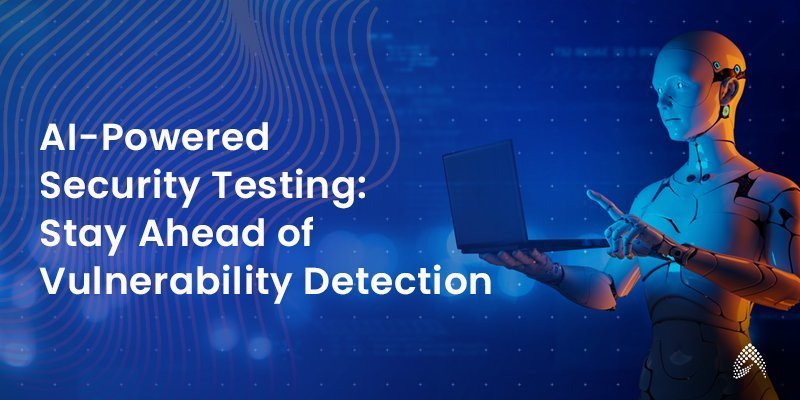The Future of Work: Enhancing Efficiency with AI-Powered Low-Code Automation

Are you ready to unlock a new era of productivity and tap into your workforce’s maximum potential?
AI-powered low-code automation holds the key.
The landscape of work is undergoing a dramatic transformation. Automation, artificial intelligence (AI), and the rise of citizen developers are reshaping industries and redefining the way we work. In this evolving environment, low-code automation empowered by AI emerges as a powerful tool to optimize efficiency, unlock human potential, and pave the way for a more productive future.
Low-code platforms are democratizing technology by enabling individuals with minimal coding experience to build applications. This empowers citizen developers within an organization to automate repetitive tasks, streamline workflows, and solve problems previously requiring extensive IT expertise, ensuring challenges such as manual tasks, cluttered systems, and limited tech expertise are a story of yesterday.
Moreover, AI integration further elevates the power of low-code platforms. AI algorithms automate complex decision-making, analyze vast datasets, and predict trends, enabling businesses to automate intelligent workflows and make data-driven decisions with unprecedented speed and accuracy. This empowers employees to work alongside AI as a ‘copilot’, enhancing their judgment and leading to better outcomes.
In this blog, our goal is to look into the rise of AI-powered low-code automation and the ways it makes that happen in a work setting.
Ways AI powered low code automation can revolutionize work
The future of work, once a futuristic vision, is now becoming present at a rapid pace. And at the forefront of this transformation lies a powerful duo: artificial intelligence (AI) and low code. Studies paint a clear picture of their combined adoption and impact, here are some:
- Gartner predicts that by 2025, 70% of new applications will be developed using low-code tools. That’s a big shift, indicating widespread adoption of this democratizing technology.
- A Statista study reveals that the global low-code development platform market is expected to reach a staggering $65 billion by 2027. This rapid growth signifies the immense value businesses see in low-code solutions.
- PwC’s AI at Work study found that 72% of businesses are already using or piloting AI, believing it will create a competitive advantage. The integration of AI with low-code platforms further amplifies this potential.
Now that we understand the magnitude and potential of AI and low code, let’s take a look at how both together are and will change the future of work.
Enhanced efficiency
Routine tasks can slow down your business, but by eliminating bottlenecks and accelerating processes with intelligent automation, you can streamline workflows and maximize productivity.
- Automating routine tasks: AI handles repetitive data entry, invoice processing, and customer service interactions, freeing up human employees for higher-value tasks like creativity, problem-solving, and strategic thinking.
- Streamlined processes: AI-powered workflows eliminate bottlenecks and optimize resource allocation, leading to faster turnaround times and improved productivity.
- Data-driven decision-making: AI analyzes data in real time, providing insights and predictions that inform strategic decision-making and improve operational efficiency.
Empowering citizen developers
Your teams can innovate and solve problems directly and faster with access to the right tools. With low-code platforms aided by AI, they can unearth the potential across your workforce better.
- Democratizing technology: Low-code platforms with AI capabilities allow individuals with non-technical backgrounds to build applications and automate processes, fostering innovation and agility.
- Faster development cycles: Citizen developers can build and deploy applications quickly, accelerating innovation and responding rapidly to changing market demands and customer needs.
- Improved collaboration: Low-code platforms enable cross-functional teams to collaborate on building solutions without relying solely on IT departments.
Reskilling and upskilling
To build a future-proof workforce, you need to focus on fostering the creative and strategic skills that thrive in an AI-powered workplace.
- Focus on higher-value skills: As automation takes over routine tasks, employees can upskill and reskill to focus on creative, strategic, and interpersonal skills that cannot be easily replaced by AI. This aligns with the future of work, where success will rely on a hybrid workforce where humans and AI technologies collaborate effectively.
- Adaptability and lifelong learning: The future workforce will require continuous learning and adaptation to thrive in an ever-evolving technological landscape.
- Personalized learning experiences: AI can personalize training programs and learning pathways, ensuring that employees acquire the skills needed for the future of work.
Transforming the customer experience
AI-driven low code technology can be used to personalize interactions, predict customer needs, deliver unparalleled support and satisfaction, and resolve issues quickly.
- AI-powered chatbots: Provide 24/7 customer support, answer FAQs, and resolve simple issues, improving customer satisfaction and reducing support costs.
- Personalized recommendations: AI can analyze customer data to personalize product recommendations, marketing messages, and offers, leading to increased customer engagement and loyalty.
- Predictive maintenance: AI can predict potential equipment failures and schedule preventive maintenance, minimizing downtime and improving customer service.
Potential challenges
While AI-powered low-code automation unlocks a future of unparalleled potential, it’s not without its challenges, some of the common ones and how they can be mitigated are discussed below.
Data privacy and security:
- Challenge: Ensuring responsible data collection, usage, and security is paramount to building trust and ethical applications.
- Solution: Implement robust data governance practices, prioritize data security measures, and consider privacy-enhancing technologies.
Bias and fairness:
- Challenge: AI systems can inherit biases from the data they train on, potentially leading to discriminatory outcomes.
- Solution: Employ bias detection tools, diversify datasets to promote representativeness, and conduct regular fairness audits throughout the development process.
Job displacement concerns:
- Challenge: Automation may lead to job losses in certain sectors, creating a need for workforce adaptation.
- Solution: Proactively invest in reskilling and upskilling programs to prepare your workforce for the future, foster a culture of continuous learning, and explore opportunities for new job creation within an evolving workplace.
While these challenges require careful consideration, the transformative potential of AI-powered low-code automation far outweighs any potential drawbacks. Let’s explore what this technology means for the future of work.
What’s ahead?
AI-powered low-code automation is not a replacement for human workers but rather a powerful tool to maximize their capabilities. For instance, in customer service, AI-powered chatbots can quickly resolve common queries, freeing up human agents to focus on complex cases and building stronger customer relationships. By embracing this technology, businesses can transform the potential of their workforce, optimize operations, and thrive in the ever-evolving future of work.
While the statistics paint a promising picture, the true potential lies in empowering your people and unleashing their creativity. At Amzur, we are expert business consultants, helping organizations of all sizes navigate this transformative journey. We offer AI and low-code tech solutions that seamlessly blend the power of low-code platforms with the intelligence of AI to help solve your business problems. Our team guides you through every step, from identifying automation opportunities to building and deploying robust AI-powered solutions.
Learn how we helped a California-based HVAC servicing company reduce its implementation time by 50% and improve customer satisfaction with the help of an AI-powered recommendation engine. Read the whole case study below.
Let Amzur guide you on your automation journey. Contact us to discuss how we can collaborate to achieve your business goals.

Technical Architect




